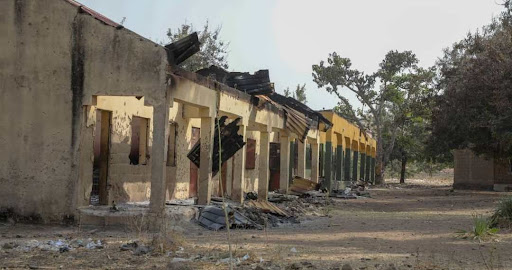Boko Haram Destroys 2,246 Classrooms In 512 Attacked Schools — Borno Official
Sub: The education sector in Borno State remains one of the most affected by the ongoing Boko Haram insurgency, with over 1300 destroyed classrooms still in the state of ruins despite efforts by the government to remedy the situation.

Education is one of the public sectors most severely affected by the Boko Haram insurgency in Northeast Nigeria. Recent data obtained by HumAngle revealed that at least 2,246 classrooms have been destroyed in the last 12 years in Borno State alone.
According to the State Universal Basic Education Board (SUBEB), a total of 500 public schools were attacked by Boko Haram insurgents between 2009 and 2021 in Borno.
Erstwhile SUBEB chairman, Dr Shettima Bukar Kullima, during an exclusive interview on Monday, Oct. 25, told HumAngle one of the board’s major focuses under his leadership was seeing to the rebuilding of the 512 destroyed schools.
Dr Kullima handed over on Tuesday after a six-year tenure as chairman.
He said that apart from the infrastructure deficit brought about by the Boko Haram insurgency, the education sector in the state was also challenged by a lack of qualified teachers, as over 500 teachers were either killed, maimed, or forced to flee for their lives.
“When we came on board six years ago, it was a time when the Boko Haram hostility was at its peak, when public schools were one of the major sectors that received the most devastating blows in the hands of the insurgents,” he said.
“The records are there; 512 of our schools were attacked and inflicted with different magnitudes of destruction. If one is to break it down, a total of 2246 classrooms were affected; and this is in addition to the destruction of various perimeter wall fences, laboratories, staff quarters, libraries, and water points.”
He said the attackers did not stop at physical infrastructure alone but also caused a significant loss of educated humanpower.
Dr Shettima said the number of teachers lost to the insurgency within the basic education component at the time he took over six years ago stood at 447.
“But over the years the figure has risen to well over 500 teachers who were either killed, missing or fled the state for their safety,” he said.
In line with the enthusiasm of the government to rebuild the destroyed schools, a core mandate was issued to SUBEB to “vigorously pursue the issue of reconstructing the destroyed schools especially within the safe locations like Maiduguri and other towns to accommodate and provide learning opportunities for the influx of displaced persons to centres and centres.”
“To get the herculean task done, Borno State had to offset its backlog of counterpart funding that denied its access to Universal Basic Education (UBEC) marching grants that the state defaulted three years pre-2011.”
“Being up to date, we were able to access all the funds from UBEC and that enabled us to execute the projects that later earned Borno a national ranking as one of the best performing states in the country.”
He added that the Borno SUBEB had in the last six years constructed or rebuilt 922 classrooms with stores, offices, and toilets.
“To provide security for the schools, we were able to build perimeter fencing for 59 schools in all the accessible locations of Borno State,” he said.
Borno has 1,324 classrooms destroyed by Boko Haram that are still waiting to be rebuilt in various deserted communities sacked by the insurgent group.
This suggests that the state contributes at least three per cent of the total number of classroom deficits in Nigeria. A UBEC report, published recently by the Nigeria Tribune, showed that “Nigeria currently has a deficit of about 43,456 classrooms.”
Dr Kullima had agreed that there was more work to be done in rekindling the embers of education in Borno, especially considering the magnitude of infrastructural destruction. Already, it has taken the state government six years to rebuild only about 41 per cent of the destroyed public schools.
Though details of how much was spent on the reconstruction projects were not provided, available data on the SUBEB website indicated that Borno received a matching grant of about N5 billion between 2015 and 2018. This means the Borno SUBEB had spent about N10 billion within the period because states are required to provide 50 per cent counterpart funding to access the grant.
The state requires nothing less than N10 billion to fix the remaining over 1300 destroyed classrooms as HumAngle learnt from officials within the state government that it costs at least N21.7 million, in contract terms, to build a block of two classrooms and two offices.
The state governor, Professor Babagana Zulum, had while inaugurating the new SUBEB commended the former executive chairman, Dr Kullima, for his contribution to the state’s basic education sector.
He, however, reminded the new board executives of the challenge ahead, saying, “The declining standard of education in Borno state is a matter of great concern.”
Zulum said though the government had done so much in replacing the destroyed educational infrastructure, such investment only matters if the educational services are qualitative.
“What matters is not the quality of our infrastructure, not the quality of teachers that we have; the things that matter is the quality of the output,” he said.
Support Our Journalism
There are millions of ordinary people affected by conflict in Africa whose stories are missing in the mainstream media. HumAngle is determined to tell those challenging and under-reported stories, hoping that the people impacted by these conflicts will find the safety and security they deserve.
To ensure that we continue to provide public service coverage, we have a small favour to ask you. We want you to be part of our journalistic endeavour by contributing a token to us.
Your donation will further promote a robust, free, and independent media.
Donate HereStay Closer To The Stories That Matter




